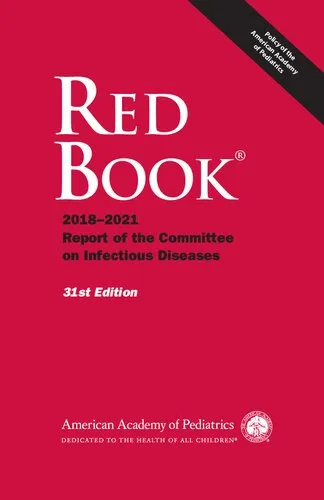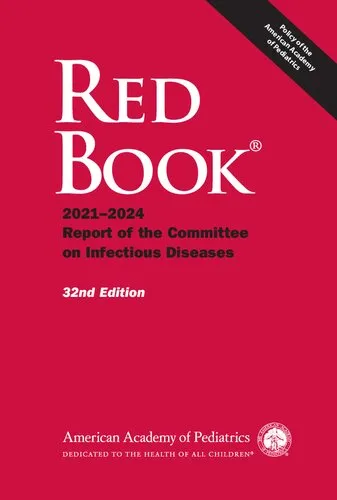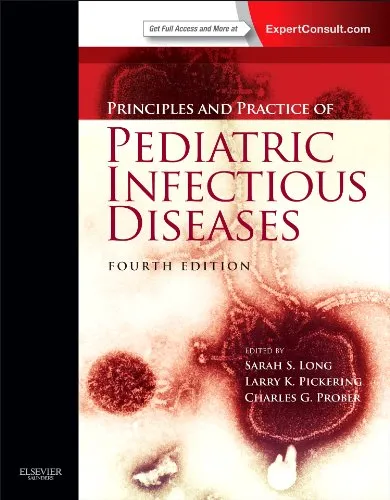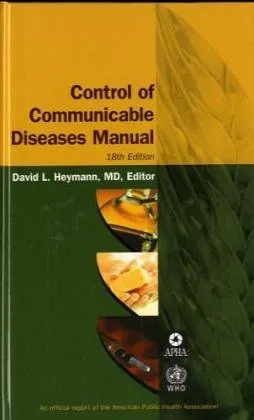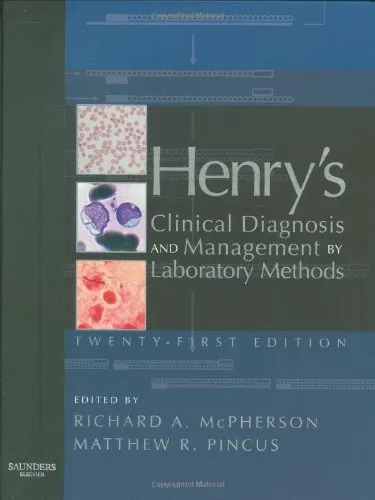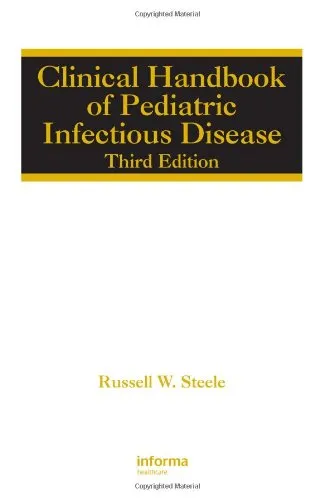Modern Infectious Disease Epidemiology: Concepts, Methods, Mathematical Models, and Public Health
4.5
بر اساس نظر کاربران

شما میتونید سوالاتتون در باره کتاب رو از هوش مصنوعیش بعد از ورود بپرسید
هر دانلود یا پرسش از هوش مصنوعی 2 امتیاز لازم دارد، برای بدست آوردن امتیاز رایگان، به صفحه ی راهنمای امتیازات سر بزنید و یک سری کار ارزشمند انجام بدینکتاب های مرتبط:
معرفی کتاب "Modern Infectious Disease Epidemiology: Concepts, Methods, Mathematical Models, and Public Health"
کتاب "Modern Infectious Disease Epidemiology" یکی از جامعترین و کاملترین منابع در زمینه اپیدمیولوژی بیماریهای عفونی است که به صورت دقیق و علمی به بررسی مبانی، روشها، مدلسازی ریاضی، و کاربردهای بهداشت عمومی میپردازد. این کتاب توسط Paulo Pinheiro، Colin D. Mathers و Alexander Krämer تألیف شده و نقش بیبدیلی در فهم بهتر پیچیدگی بیماریهای عفونی و تأثیر آنها بر سلامت عمومی ایفا میکند.
خلاصهای کامل از کتاب
این کتاب به چهار بخش مهم تقسیم میشود که هر یک با رویکردی منحصربهفرد، مبانی و اصول اپیدمیولوژی بیماریهای عفونی را تشریح میکنند. در بخش نخست به معرفی مفاهیمی چون انتشار بیماریها، شاخصهای ارزیابی اپیدمیهای عفونی مانند R0 و تاثیر گسترش بیماریها بر جوامع انسانی پرداخته میشود. در بخش دوم، روشهای علمی و اپیدمیولوژیک برای تحلیل دادهها و کنترل بیماریهای عفونی بررسی میگردد. همچنین مباحث پیشرفتهای مانند استفاده از مدلسازی ریاضی برای پیشبینی روند بیماریها ارائه شده است. بخشهای بعدی کتاب بیشتر به راهحلهای نوین بهداشت عمومی در مقابله با بیماریهای واگیردار میپردازند و چگونگی اجرای سیاستهای پیشگیری و مداخلات مبتنی بر شواهد علمی را برجسته میسازند.
نکات کلیدی و پیامهای مهم
- تأکید بر اصول پایهای اپیدمیولوژی نظیر فهم رفتار دینامیک بیماریهای عفونی.
- بررسی ابزارهای کاربردی از جمله Mathematical Models برای تحلیل دادههای بیماریها.
- توسعه مهارتهای علمی در ردیابی شیوع اپیدمیها و پیشنهاد راهکارهای بهداشتی مناسب.
- ارائه مثالهای واقعی از شیوع بیماریها، نظیر آنفلوانزا و ویروس HIV، جهت درک عمیقتر مفاهیم علمی.
- ترکیب دیدگاههای کلاسیک اپیدمیولوژی با رویکردهای مدرن و مبتنی بر داده.
نقلقولهای برجسته از کتاب
"Understanding the dynamics of infectious diseases is not just a scientific pursuit; it is a tool that can save lives and improve global health systems."
"Mathematical Models are the bridge between data observation and actionable public health policies."
چرا این کتاب مهم است؟
کتاب "Modern Infectious Disease Epidemiology" به دلایل متعددی از جمله محتوای جامع، نگرش چندرشتهای و تأکید بر مداخلات عملی در بهداشت عمومی، اهمیت بسزایی دارد. با افزایش خطرات جهانی مانند بیماریهای نوظهور و پاندمیها، این کتاب به متخصصان و دانشجویان اپیدمیولوژی ابزارهای لازم برای تحلیل و مقابله با این تهدیدها را ارائه میدهد. خواندن این کتاب همچنین به ارتقاء مهارتهای تحلیلی و تصمیمگیری در بحرانهای بهداشتی کمک میکند. علاوه بر این، استفاده از مفاهیم مدرن علمی مانند مدلسازی ریاضی در این کتاب، آن را متمایز کرده و به منبعی ایدهآل برای پژوهشگران و تصمیمگیران حوزه سلامت تبدیل مینماید.
Introduction to "Modern Infectious Disease Epidemiology"
"Modern Infectious Disease Epidemiology: Concepts, Methods, Mathematical Models, and Public Health" serves as a comprehensive guide to understanding the diverse dimensions of infectious disease epidemiology. This book stands as a testament to the rapidly evolving field of epidemiology and its importance in addressing some of the world's most pressing public health challenges. Combining theoretical frameworks, epidemiological methods, mathematical modeling techniques, and practical applications, the book is an invaluable resource for students, researchers, and public health professionals.
Detailed Summary of the Book
Written by experts in the field, this book bridges the gap between classical epidemiology and modern analytical methods. The material is presented in a way that balances theoretical discussions with real-world applications, making it accessible to beginners while still offering depth for advanced readers.
The book starts with foundational concepts, introducing the reader to the basic epidemiology of infectious diseases. Core topics such as transmission dynamics, herd immunity, and the distinction between endemic and epidemic diseases are explained clearly. The authors then delve into statistical and mathematical models that have become essential in predicting and understanding the spread of diseases. Methods such as SIR (Susceptible-Infectious-Recovered) models, cohort analyses, and outbreak investigations are covered extensively.
The next section focuses on integrating these concepts into public health practice. Case studies and examples from diseases like HIV, tuberculosis, influenza, and more contemporary challenges such as emerging viral outbreaks are presented, demonstrating the relevance of epidemiology in guiding public health interventions. Additionally, the book explores global health dimensions, addressing disparities in disease burden and the challenges of disease control in both high- and low-resource settings.
One of the unique features of this book is its emphasis on interdisciplinary approaches. Readers are encouraged to look beyond biology and medicine, incorporating insights from sociology, economics, and computer science into their epidemiological studies. With advancements in big data and computational power, the text also touches on how modern tools have reshaped the field, equipping readers with skills to tackle contemporary problems.
Key Takeaways
- Understanding Disease Transmission: Learn the key determinants and mechanisms of how infectious diseases spread within populations.
- Applying Mathematical Models: Gain hands-on knowledge of modeling approaches like SIR models to analyze and predict epidemic trends.
- Real-World Applications: Explore case studies tied to both historical outbreaks and contemporary challenges to understand how theory translates into practice.
- Emphasis on Global Health: Recognize the importance of epidemiology in addressing inequities in disease burden across diverse populations.
- Interdisciplinary Perspective: Discover how disciplines like statistics, sociology, and computer science enhance the scope and depth of infectious disease epidemiology.
Famous Quotes from the Book
"Infectious diseases do not recognize borders—neither geographic, political, nor social."
"The effective control of infectious diseases requires more than just knowledge; it necessitates coordinated action backed by precise data and robust models."
Why This Book Matters
Infectious diseases remain one of humanity's greatest challenges, as evidenced by epidemics and pandemics that have shaped the world. From the crises of HIV to the global disruptions caused by COVID-19, understanding infectious disease epidemiology has never been more crucial.
This book not only equips readers with the epidemiological tools and skills needed to study infectious diseases but also empowers them to think critically and globally. Its interdisciplinary approach ensures that the solutions proposed are grounded in both data-driven practices and a deep appreciation of social contexts. Whether you're an aspiring epidemiologist, a public health official, or a policymaker looking to make data-informed decisions, this book offers the knowledge base and analytical skills you need.
In a world where infectious diseases continue to emerge and re-emerge, "Modern Infectious Disease Epidemiology" is your essential companion in understanding, predicting, and mitigating these threats to human health.
دانلود رایگان مستقیم
شما میتونید سوالاتتون در باره کتاب رو از هوش مصنوعیش بعد از ورود بپرسید
دسترسی به کتابها از طریق پلتفرمهای قانونی و کتابخانههای عمومی نه تنها از حقوق نویسندگان و ناشران حمایت میکند، بلکه به پایداری فرهنگ کتابخوانی نیز کمک میرساند. پیش از دانلود، لحظهای به بررسی این گزینهها فکر کنید.
این کتاب رو در پلتفرم های دیگه ببینید
WorldCat به شما کمک میکنه تا کتاب ها رو در کتابخانه های سراسر دنیا پیدا کنید
امتیازها، نظرات تخصصی و صحبت ها درباره کتاب را در Goodreads ببینید
کتابهای کمیاب یا دست دوم را در AbeBooks پیدا کنید و بخرید
1441
بازدید4.5
امتیاز0
نظر98%
رضایتنظرات:
4.5
بر اساس 0 نظر کاربران
Questions & Answers
Ask questions about this book or help others by answering
No questions yet. Be the first to ask!




